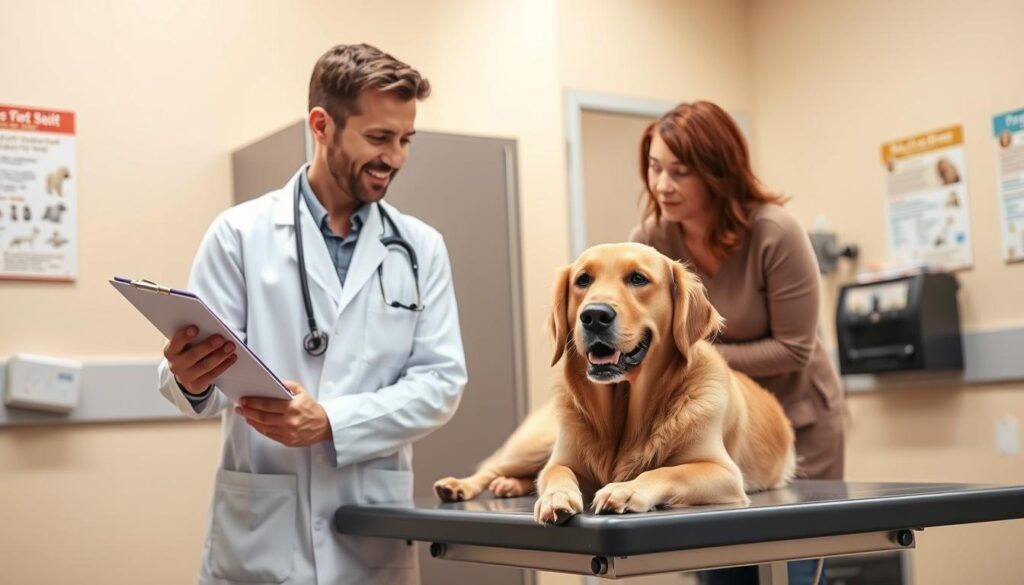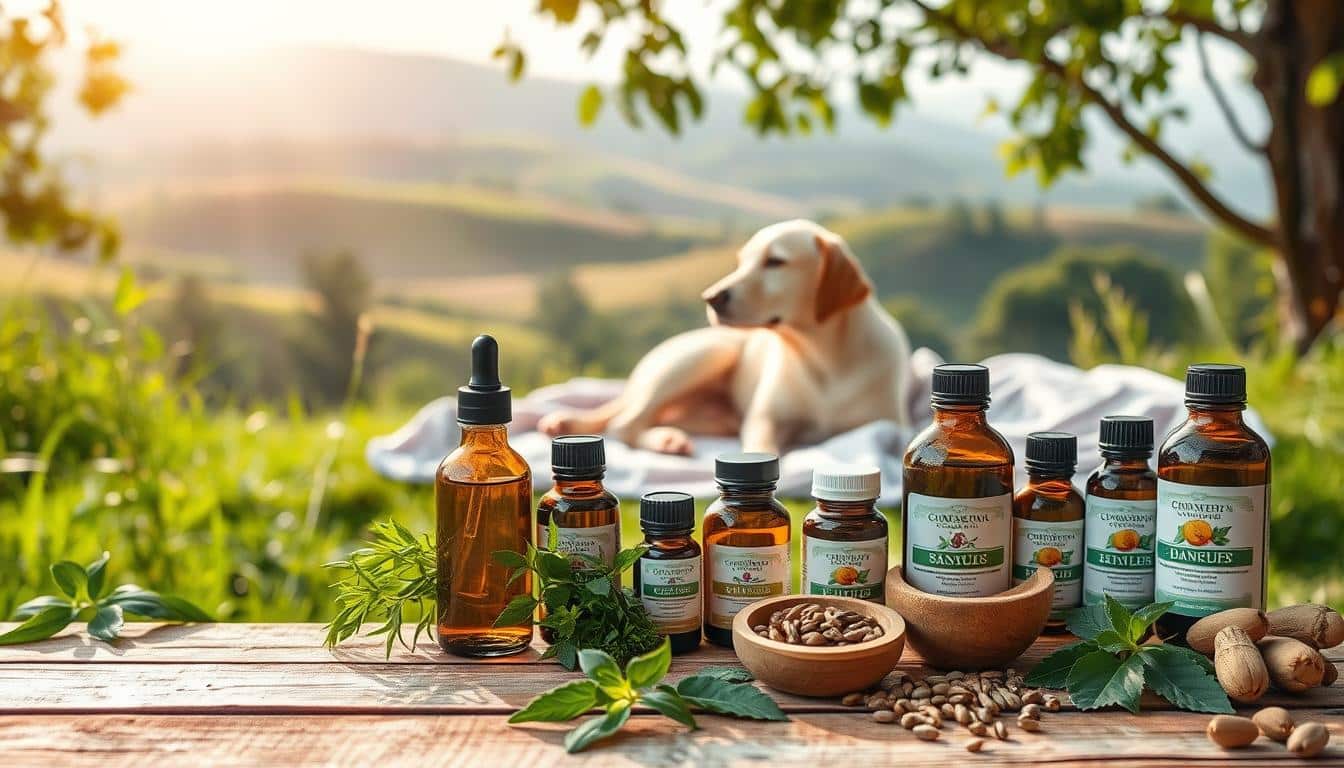A dog’s diet greatly affects its skin health. Nutrition is key for a dog’s overall well-being. The skin shows if a dog’s diet is lacking.
Issues like dryness and flakiness can bother your dog. It’s important to understand how diet impacts skin health. This knowledge can help prevent skin problems and keep your dog’s coat looking good.
Understanding Canine Skin Health
The skin is more than just a protective layer. It’s key to a dog’s health. Knowing about the skin’s role is crucial for their well-being. It’s essential to know how diet affects the skin.
The Importance of Skin as an Organ
The skin is a vital organ in dogs, making up about 10-15% of their body weight. It acts as a shield against dangers like allergens and bacteria. Keeping the skin healthy helps dogs fight off infections.
It also keeps them hydrated by holding in moisture. This makes sure dogs stay comfortable and in good health.
Common Skin Functions in Dogs
A dog’s skin does several important things for their health. These include:
- Thermoregulation: It helps control body temperature, keeping them cool when needed.
- Barrier Protection: It guards internal organs from outside threats, which is key for immune defense.
- Sensory Perception: The skin’s nerve endings let dogs feel touch, pressure, and pain. This helps them understand their surroundings.
- Vitamin D Synthesis: Sunlight helps their skin make vitamin D, important for health.
Healthy skin means dogs are overall healthier. Teaching about dog skin health highlights the need to look after their diet for their skin to work well.
Signs of Skin and Coat Conditions in Dogs
Watching your dog’s skin and coat is key to spotting problems early. Many signs can show your dog might have a skin issue that needs looking into. Spotting these early means your pet can get the help they need fast, keeping them happy and healthy.
Recognizing Symptoms
Symptoms that your dog might have a skin problem include:
- Excessive scratching or biting at the skin
- Itching that leads to discomfort
- Loss of fur or thinning coat
- Dull or greasy fur texture
- Ear infections that can be related to skin allergies
- Gastrointestinal issues stemming from dietary sensitivities
These could mean there’s a bigger issue underneath. Spotting them early can help stop things from getting worse and speed up healing.
Common Skin Issues to Watch For
Here are some common skin problems dogs face:
- Allergic reactions to food or the environment
- Fungal infections causing irritation
- Parasite problems, like fleas or ticks
- Dermatitis from touching irritants
Knowing about these problems helps you keep an eye on your dog’s health. If you think your dog is dealing with any of these, it’s important to talk to a vet right away.
How Nutrition Affects Skin Health
Nutrition is super important for keeping dogs’ skin healthy. The right food gives them strong and flexible skin. This helps their skin act as a shield from the outside world. Knowing what food is good helps pet owners take great care of their dogs.
The Skin’s Nutritional Needs
Dogs need a diet full of good proteins, fats, vitamins, and minerals. Proteins help fix skin and keep it lively. Omega-3 and omega-6 fats keep the skin moist and looking good.
Vitamins like A, E, and various B types are crucial too. They help skin cells grow and fix themselves.
Consequences of Nutritional Deficiencies
Not eating the right food can damage a dog’s skin barrier. This might lead to dry, scaly skin and infections. When dogs don’t get the nutrition they need, they’re more open to skin issues. This can make them feel a lot worse overall.
Common Causes of Dog Skin Conditions
It’s essential to know what causes dog skin issues. Both what’s outside and inside matters a lot in skin health. Spotting these causes helps fix skin problems and betters your dog’s life.
External and Internal Factors
Outside causes of skin troubles in dogs are everywhere. They include:
- Parasites, such as fleas and ticks
- Infections, including bacterial or fungal
- Environmental pollutants like dust, mold, and pollen
- Certain ingredients in dog food that may cause reactions
Things inside, like hormone issues and genes, affect skin too. Knowing these helps find out why skin problems happen and fixes them.
Recognizing Allergies and Sensitivities
When dogs have allergies, you might see itching, swelling, or red spots. Spotting allergy signs early is key. Here’s what can cause them:
- Food ingredients, such as grains or specific proteins
- Environmental substances, including dust mites and pollen
- Flea bites that lead to allergic reactions
Being around allergens a lot can make skin issues worse. Talking to a vet helps figure out what’s causing the problem and how to treat it right.
How Diet Affects Your Dog’s Skin
Dog skin health depends a lot on what they eat. They need nutrients that boost both their overall health and skin health. Ingredients that the body can easily absorb are key for a shiny coat and healthy skin. Good proteins and fats are especially important for keeping their skin in top condition.
Ignoring the quality of a dog’s diet can cause health problems. Low-quality food or a bad homemade diet can mess up their nutrition. When their diet isn’t right, dogs can develop skin problems. That’s why focusing on high-quality food is so important. A good diet keeps dogs looking great and helps them fight off skin issues.
Essential Nutrients for Healthy Skin and Coat
A balanced diet with essential nutrients is key for dogs’ skin and coat health. High-quality proteins, omega fatty acids, vitamins, and minerals make up this diet. They help support overall health and meet the specific needs of the skin.
High-Quality Proteins
Proteins are crucial for renewing skin cells and keeping the coat shiny. They give amino acids needed for tissue repair and growth. Good protein sources like chicken, fish, or lamb give dogs the necessary elements for healthy skin.
Important Fatty Acids: Omega-3 and Omega-6
Omega-3 and omega-6 fatty acids are vital for skin health in dogs. They keep the skin moist, prevent it from drying, and ease inflammation. Fish oil and flaxseed are great for omega-3, and sunflower and safflower oils are good for omega-6. Adding these to your dog’s food will improve their coat’s health and resilience.
Vitamins and Minerals Critical for Skin Health
Vitamins A, E, and B complex, along with minerals like zinc and selenium, boost skin vitality. These nutrients help maintain the skin’s barrier, aid in cell repair, and enhance the immune response. A balanced diet with these vitamins and minerals is crucial for top-notch skin health.
Therapeutic Diets for Skin Health
Many dogs with skin conditions can find relief through therapeutic diets. These foods are made to tackle health issues, focusing on skin and coat. They offer specific nutrients for dogs with allergies, dermatitis, or skin problems.
What are Therapeutic Dog Foods?
Therapeutic dog foods are designed to fix health issues with a special nutritional mix. They can reduce inflammation and better skin health. Key ingredients include high-quality proteins, essential fats, and vitamins for healthy skin.
When to Consider a Specialized Diet
Talking to a vet is key to decide if your dog needs a specialized diet. If your dog has skin irritations or is often itching, such a diet could help. It can soften symptoms and make your dog’s skin better, making them feel good.
Grooming and Skin Care
Keeping your dog’s skin healthy is closely linked to regular grooming. This routine not only makes your pet look great but also supports their skin health. Grooming removes dirt, debris, and extra fur, helping to avoid matting that can irritate the skin.
It also lets you catch any skin problems early for quick help.
The Importance of Regular Grooming
Grooming regularly helps you and your dog grow closer. It’s a chance to check for skin issues or irritations. Groomed dogs are at a lower risk for infections, allergies, and other skin troubles. Making grooming a part of your daily life helps keep your dog happy and healthy.
Products That Support Skin Health
Choosing the right products is key for your dog’s skin care. Good quality shampoos and conditioners with natural ingredients keep the skin moist and the coat nice. Pick products that moisturize but don’t have harsh chemicals. These products clean well and maintain the skin’s oils, making the coat both healthy and shiny.
Consulting Your Veterinarian
For your dog’s skin health, seeing a vet is key. Vets have deep knowledge that goes beyond regular care. They’re crucial for understanding your pet’s needs, especially skin issues.
Regular check-ups catch problems early. This ensures your dog gets the best care possible.
Importance of Professional Guidance
Expert advice is vital for your dog’s skin health. Vets spot signs and symptoms that owners might miss. They’ll guide you on tailored treatments and care, like diet or skincare tips.
This can stop serious issues in the future, saving money and stress.
Assessing Nutritional Needs and Health Conditions
A detailed look at your dog’s diet is part of their health check. Vets check both their looks and what they eat. Changing their diet can boost their skin health.
Vets might recommend special foods or supplements. These help with your dog’s specific health needs for better skin.

Conclusion
The link between a dog’s diet and skin health is strong. When you feed your dog foods rich in essential nutrients, their skin and coat thrive. What your dog eats greatly affects their health.
Adding regular grooming and vet visits helps too. These make sure your dog’s diet works well for their skin.
When you understand how important food is for your dog, you make better choices. Healthy skin shows you’re taking good care of your dog. With the right food, grooming, and expert advice, your dog will be at their best.
By focusing on nutrition and care, you show your love for your dog. Good food and care mean a happy, healthy life for your pet. Every effort you make improves your furry friend’s quality of life.
FAQ
How can diet affect my dog’s skin health?
What are some common signs of skin problems in dogs?
What essential nutrients are vital for my dog’s skin health?
Are there specific dog foods that help with skin conditions?
How often should I groom my dog to maintain skin health?
What should I do if I suspect my dog has food allergies?
Can poor diet lead to long-term skin issues in dogs?
When should I consider switching my dog to a specialized diet?
Content created with the help of Artificial Intelligence.



